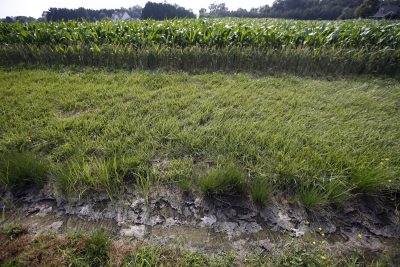The House Agriculture Committee advanced the Republican-led farm bill in a 34-17 vote early Thursday after a marathon markup that was clouded by partisan fighting about the package.
EPA Moves to Rescind “Waters of the U.S.” Rule
“The rule, known as Waters of the United States, or Wotus, had extended existing federal protections of large bodies of water, such as the Chesapeake Bay and Puget Sound, to smaller bodies that flow into them, such as rivers, small waterways and wetlands. Issued under the authority of the 1972 Clean Water Act, the rule has been hailed by environmentalists. But farmers, ranchers and real estate developers oppose it as an infringement on their property rights.
“President Trump signed an executive order in February directing Scott Pruitt, the administrator of the Environmental Protection Agency, to begin the legal process for rolling back the water rule, calling it ‘one of the worst examples of federal regulation.'”
Today's #WOTUS action is a significant step to return power to states & provide regulatory certainty to our nation’s farmers and businesses. pic.twitter.com/TwUZeyphoB
— Administrator Pruitt (@EPAScottPruitt) June 27, 2017
Ms. Davenport explained that, “On Tuesday, Mr. Pruitt released a 42-page proposal to rescind the rule. Publication of the plan is the first step in a lengthy legal process that the Trump administration must undertake to eventually enact a new regulation, one that is expected to have far fewer restrictions and pollution protections. The administration will also have to detail its legal reasoning for scaling back the rule, a case environmental groups are sure to challenge.
“The proposed rollback of the Obama water protection rule will have little immediate practical effect: A federal court had already delayed implementation of the regulation until legal questions are resolved.”
DTN writer Todd Neeley reported yesterday that, “The federal government is turning back the clock on the controversial waters of the United States, or WOTUS, rule — quite literally — with a proposal announced on Tuesday to recodify the law as it was written prior to 2015.
“The U.S. Environmental Protection Agency said in a news release that the move will allow for a second rulemaking down the road.
‘This action would, when finalized, provide certainty in the interim, pending a second rulemaking in which the agencies will engage in a substantive re-evaluation of the definition of ‘waters of the United States,’ the EPA said.
Eli Stokols reported yesterday at The Wall Street Journal Online that, “Coming almost a month after Mr. Trump announced plans to withdraw the U.S. from the Paris climate accord, Tuesday’s move is another sign the new administration and the EPA under administrator Scott Pruitt intend to prioritize the economic concerns of industry and agricultural interests over environmental concerns and, more broadly, to erase significant pieces of former President Barack Obama’s legacy.”
“Environmental groups uniformly blasted the EPA’s announcement on Tuesday, promising to challenge the agency’s move in the courts,” the Journal article said.

Washington Post writers reported yesterday that, “Pruitt told senators in testimony Tuesday that the Obama-era rule ‘created a situation where farmers and ranchers, landowners across the country did not know whether their stream or dry creek bed, in some instances, was actually subject … to EPA jurisdiction and EPA authority.’ He said that ‘they were facing fines that were substantial as they engaged in earth work to build subdivisions — I mean, it was something that created a substantial amount of uncertainty and confusion.'”
Pleased Administrator Pruitt & @EPA have listened to our concerns & taken an important first step to rescind #WOTUS. https://t.co/Sppbyaj0h2
— Pat Roberts (@SenPatRoberts) June 27, 2017
With respect to lawmaker perspective on the executive branch action, Senate Agriculture Committee Chairman Pat Roberts (R., Kans.) indicated yesterday that, “With a rewrite of the WOTUS rule, I look forward to seeing a rule that recognizes and respects the environmental strides taken by the American farmer and rancher.
I’m grateful to have an EPA that listens to and addresses the concerns of rural America, a vital segment of our economy and true stewards of our natural resources.
House Ag Committee Chairman Mike Conaway (R., Tex.) stated yesterday that, “Today’s EPA announcement is an important first step to getting the federal government out of America’s backyards, fields and ditches and restoring certainty and integrity to our regulatory process.”
It is time to get the govt out of America’s backyards, fields & ditches and restore certainty & integrity to our regulatory process. #WOTUS pic.twitter.com/HWeYKejYcN
— House Ag Committee (@HouseAgNews) June 27, 2017
And Rep. Adrian Smith (R., Neb.) noted yesterday that, “WOTUS was one of the most flagrant abuses of regulatory power in modern history and threatened the future of agriculture…[T]oday’s repeal proposal is another important step toward certainty and relief for producers, landowners, and local communities.”
Water quality issues remain an important issue for U.S. agriculture. A legal case filed in 2015 by Des Moines Water Works involving financial damages for treatment of nutrient-impacted water runoff from farm fields, challenged some exemptions of the Clean Water Act.
Although that case was dismissed, The Des Moines Register editorial board noted in March that, “The deteriorating state of Iowa’s rivers and streams is more than an environmental, quality-of-life issue; it’s also becoming a major burden on taxpayers and water-utility ratepayers and a threat to Iowa’s ag-based economy.”





